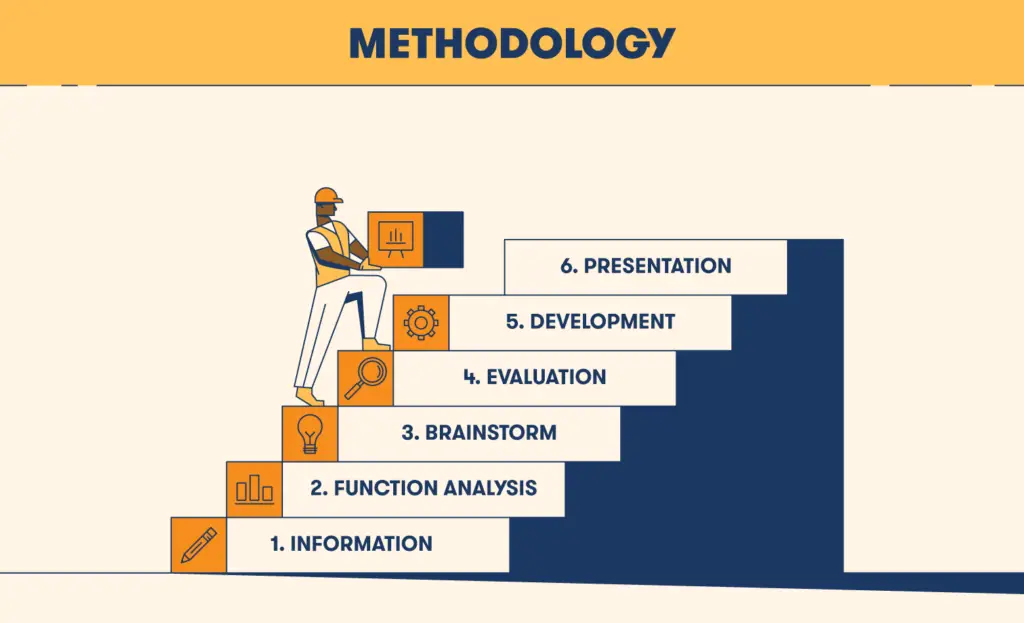The early stages of a Value Methodology (VM) study are crucial, and “Strategic Planning in VM: Navigating the Pre-Workshop Phase” provides an in-depth examination of the significant role played by strategic planning during this phase.
Careful planning and foresight are essential when establishing foundational strategies and objectives, which set the tone and direction for the entire workshop. This phase involves a comprehensive assessment of the organization’s current position, a clear understanding of its strategic objectives, and the alignment of these objectives with the VM study’s goals.
It is a time for stakeholder analysis, resource allocation, team composition, and the development of a structured workshop agenda. Effective strategic planning is not only about logistical preparation but also about integrating the VM study into the organization’s strategic fabric.
This approach ensures that the VM workshop is a transformative experience and a strategic tool that drives the organization towards achieving its long-term goals while enhancing overall value. The pre-workshop phase is not merely a precursor but a critical component of the VM process, setting the stage for a focused, effective, and value-driven workshop.

In-depth Objective Setting
The strategic planning phase begins with a comprehensive definition of objectives. These objectives must be specific, measurable, achievable, relevant, and time-bound (SMART). They should directly correspond with the strategic goals and priorities of the organization, ensuring that the VM study is focused and goal-oriented.
Thorough Organizational Analysis
A deep understanding of the organizational context is crucial. This analysis involves evaluating the current operational processes, market position, competitive landscape, and internal dynamics. It helps in tailoring the VM study to address specific organizational challenges and opportunities.
Extensive Stakeholder Mapping and Engagement
Identifying and understanding stakeholders is critical. This process goes beyond mere identification; it involves analyzing stakeholders’ influence, expectations, and needs. Engaging stakeholders through interviews, surveys, or workshops ensures their perspectives are integrated into the VM planning process.
Detailed Resource Planning
Resource allocation requires careful planning. It involves assessing the resources necessary for the VM study, including personnel, time, financial resources, and technical tools. A well-planned resource allocation strategy is essential for the smooth execution of the VM study.
Strategic Team Composition
The selection of the VM team is a strategic decision. The team should include individuals with diverse expertise, including technical experts, financial analysts, and representatives from key stakeholder groups. The team’s composition should reflect the interdisciplinary nature of the VM study.
Like Us on Facebook!
Crafting a Comprehensive Agenda
Developing a detailed agenda for the VM workshop is critical. The agenda should cover all phases of the VM process, from orientation to final recommendations. It should allocate adequate time for brainstorming, analysis, and consensus-building.
Subscribe Us on YouTube!
Pre-workshop Training and Orientation
Providing training or orientation to the VM team is vital for ensuring that all members are aligned and understand the VM methodology. This training should cover VM principles, tools, and techniques, as well as the specific objectives of the study.
Proactive Risk Management
Strategic planning must include a robust risk assessment. Identifying potential risks, whether internal or external, and developing strategies to mitigate these risks ensures the VM study is resilient and adaptable.
Effective Communication Strategy
Developing a clear communication strategy is essential. This strategy should detail how information will be disseminated among team members and stakeholders, ensuring transparency and maintaining engagement throughout the VM process.
Feedback and Adjustment Mechanisms
Establishing channels for continuous feedback during the planning phase allows for ongoing adjustment and alignment. This iterative approach ensures that the VM study remains relevant and responsive to changing circumstances.
Alignment with Best Practices and Industry Standards
The planning process should align with recognized best practices and industry standards. This alignment ensures that the VM study adheres to high-quality standards and delivers credible, value-driven outcomes.
Setting Expectations for Outcomes
Clearly defining what successful outcomes look like is important. This clarity helps in aligning the team’s efforts and evaluating the success of the VM study post-workshop.
Achieving optimal outcomes in Value Methodology requires meticulous and strategic preparation during the pre-workshop stage, particularly in the strategic planning phase. This phase encompasses a broad range of critical activities that lay the foundation for a successful VM study.
These activities include setting SMART objectives that align with the organization’s broader goals, conducting a thorough organizational analysis to tailor the VM approach to specific needs, engaging stakeholders to integrate diverse perspectives, and allocating resources carefully to ensure all necessary tools and personnel are in place.
Moreover, selecting a well-rounded VM team, crafting a detailed and structured workshop agenda, providing targeted training and orientation, implementing robust risk management strategies, and developing an effective communication strategy are all integral components of this phase.
Aligning these efforts with industry best practices and standards enhances the VM study’s credibility and relevance. The goal of this extensive planning is not only to ensure a successful workshop but to set the stage for VM initiatives that drive significant value enhancements aligned with strategic objectives.
Therefore, the strategic planning phase is not just a preliminary step but a critical determinant of the VM study’s direction, effectiveness, and ultimate success.
Author
Abdulrahman Alnassar is multitalented professional and author. With over 10 years of experience in construction engineering & management, economics, investing, life coaching, and leadership. Abdulrahman expertise in managing complex construction projects is matched by his acumen in economics and investment strategies. As a life coach and leadership mentor, he combines practical wisdom with an empathetic approach, guiding individuals towards achieving their personal and professional goals. His writings offer insightful perspectives, blending industry knowledge with a passion for personal growth.

















